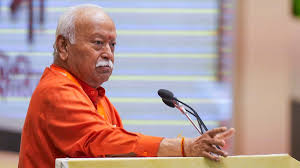
Mohan Bhagwat: Global Trade Must Be Free from Pressure

 :
| Updated On: 28-Aug-2025 @ 11:27 am
:
| Updated On: 28-Aug-2025 @ 11:27 amSHARE
In the backdrop of the United States imposing a 50% tariff on Indian goods, Rashtriya Swayamsevak Sangh (RSS) chief Mohan Bhagwat stressed that India’s national policy must ensure international trade is conducted on a voluntary basis, not under external pressure. Speaking at Vigyan Bhawan on the second day of the three-day lecture series “100 Years of the Sangh’s Journey – New Horizons”, Bhagwat presented the Sangh’s vision on self-reliance, cultural values, governance, and India’s global role as RSS approaches its centenary. The lecture, attended by diplomats from over 55 nations and 30 international organisations, coincided with escalating Indo-US trade tensions.
Bhagwat argued against unnecessary imports, insisting India should only import life essentials that cannot be domestically produced. He underlined self-reliance and “swadeshi” as the basis of national policy, explaining that while interdependence is natural, prioritising local products strengthens domestic economies. Illustrating this with simple examples, he asked why Indians should buy Coke or Sprite when they can make lemon water at home, and clarified that self-reliance does not mean isolationism but prioritising indigenous production while remaining globally connected.
Urging citizens to support local economies, he encouraged buying goods produced within villages, states, and regions, stressing that neglecting local industries harms rural livelihoods. Bhagwat extended this idea of “swadeshi” to lifestyle, advocating the practice of “bhasha, bhusha, bhojan, bhawan aur bhajan”—using native languages, traditional dress, local cuisine, cultural homes, and maintaining spiritual practices. He added that true Hindu living requires a prayer space at home, and while modern attire is acceptable, Indians must also preserve traditional knowledge such as wearing a dhoti.
On constitutional values, Bhagwat emphasised strict adherence to law and the Constitution, warning against taking the law into one’s own hands. He urged restraint even in the face of provocation, advising people to rely on legal recourse rather than violence.
Addressing global socio-political trends, Bhagwat warned of growing radicalism, unrest, and “wokeism,” describing them as crises threatening global unity. He argued that consumerism and materialism are driving forces behind moral decline and quoted Mahatma Gandhi’s notion of the “seven social sins,” including commerce without morality and politics without principle.
Outlining India’s regional role, he said India must first reconnect with its neighbours, many of whom share cultural, geographic, and historical ties. As the largest country in the subcontinent, India bears responsibility for promoting peace, stability, and prosperity in the region, he argued.
Bhagwat devoted a major part of his address to the concept of dharm, distinguishing it from religion. According to him, dharm is higher than religion—it embraces diversity, fosters balance between the individual, society, and nature, and offers a holistic framework for life. He said India, as a dharmic civilisation, must inspire the world with its values, echoing Swami Vivekananda’s vision of India giving dharm to humanity.
Concluding, Bhagwat envisioned the RSS as a global model for governance and people-centric economics. He advocated policies rooted in India’s vision—shifting from “mass production” to “production by the masses.” These ideas, he suggested, should first strengthen India and its neighbourhood, before being shared globally for the greater good.